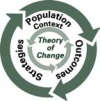| About Us |
| Background |
| Logic Model Development |
| SOC Practice Review |
| Narrated Presentations |
| Training and Technical Assistance |
| Resource Library |
| News and Announcements |
| Contact Us |
| FAQ |
| Site Map |
Recommended Reading
| Ideas Into Action
For more detailed information on a theory of change approach, refer to the monograph Crafting Logic Models for Systems of Care: Ideas Into Action (En Espanol) written by Mario Hernandez and Sharon Hodges. The theory of change approach described in the monograph is intended to help communities that are developing a system of care to:
|
Theories of Change. Making Programs Accountable and Making Sense of Program Accountability
Aronson, S., Mutchler, S., & Pan, D. (1998). Theories of Change. Making Programs Accountable and Making Sense of Program Accountability. Southwest Educational Development Laboratory.
New Approaches to Evaluating Community Initiatives: Concepts, Methods and Contexts
Connell, A.C., Kubisch, L.B., Schorr & C.H. Weiss (eds.) (1992). New Approaches to Evaluating Community Initiatives: Concepts, Methods and Contexts. Washington, DC: The Aspen Institute.
Applying a Theory of Change Approach to Interagency Planning in Child Mental Health
Hernandez, M. & Hodges, S. (2006) Applying a theory of change approach to interagency planning in child mental health. American Journal of Community Psychology, 38(3) 165-173
Building Upon Theory of Change for Systems of Care
Hernandez, M., & Hodges, S. (2003). Building upon theory of change for systems of care. Journal of Emotional and Behavioral Disorders 11(1), 19-26.
Creating Change and Keeping it Real: How Excellent Child-serving Organizations Carry Out Their Goals
Hodges, S., Hernandez, M., Nesman, T., & Lipien, L. (2002). Creating change and keeping it real: How excellent child-serving organizations carry out their goals. Tampa, Florida: University of South Florida, Louis de la Parte Florida Mental Health Institute, Department of Child and Family Studies, The Research and Training Center for Children's Mental Health.
Developing Outcome Strategies in Children's Mental Health
Hernandez, M. & Hodges, S. (2001) Theory-based Accountability. In M. Hernandez and S. Hodges (Eds.) Developing Outcome Strategies in Children's Mental Health. Baltimore, MD: Paul H. Brookes Publishing Co., Inc.
Using Logic Models and Program Theory to Build Outcome Accountability
Hernandez, M. (2000). Using Logic Models and Program Theory to Build Outcome Accountability. Education and Treatment of Children 23(1).
The Ecology of Outcomes: System Accountability in Children's Mental Health
Hernandez, M., Hodges, S., & Cascardi, M. (1998). The Ecology of Outcomes: System Accountability in Children's Mental Health. The Journal of Behavioral Health Services & Research, 25(2).
How Organizational Culture Influences Outcome Information Utilization
Hodges, S. & Hernandez, M. (1998). How Organizational Culture Influences Outcome Information Utilization. Evaluation and Program Planning, 22 (1999) 183-197.
The Utilization of the Logic Model As A System Level Planning and Evaluation Device
Julian, David A. (1997). The Utilization of the Logic Model As A System Level Planning and Evaluation Device. Evaluation and Planning, 20 (3), pp. 251-257.
Open Systems Evaluation and the Logic Model: Program Planning and Evaluation Tools
Julian, D.A., Jones, A., & Deyo, D. (1995). Open Systems Evaluation and the Logic Model: Program Planning and Evaluation Tools. Evaluation and Program Planning, 18 (4), 333-341.
Utilization-Focused Evaluation
Patton, M.Q. (1997). Utilization-Focused Evaluation (3rd Edition). Thousand Oaks, CA Sage Publications.
Building systems of care: A primer
Pires, S. A. (2002).Building systems of care: A primer. Washington DC: National Technical Assistance Center for Children's Mental Health.
Savas, S.A, Fleming, W., & Bolig, E. (1998, May). Program Specification: A Precursor to Program Monitoring and Quality Improvement. A Case Study From Boysville of Michigan, The Journal of Behavioral Services & Research, 25 (2), pp. 208-216.
Stecher, B. M., & Davis, W. A. (1987). How to Focus an Evaluation. Newbury Park, CA: Sage Press.
Systems of care for children and adolescents with severe emotional disturbances: what are the results?
Stroul, B. (1993). Systems of care for children and adolescents with severe emotional disturbances: what are the results? Washington, DC: Georgetown University Child Development Center.
A System of Care for Emotionally Disturbed Children and Youth
Stroul, B. A. & Friedman, R. M. (1986). A system of care for emotionally disturbed children and youth. Washington, DC: CASSP Technical Assistance Center. United Way of America (1996). Measuring Program Outcomes: A Practical Approach.
Handbook of Practical Program Evaluation
Wholey, J. S., Hatry, H. P. & Newcome, K. E. (eds.) (1994). Handbook of Practical Program Evaluation. San Francisco, CA: Jossey-Bass Inc.

